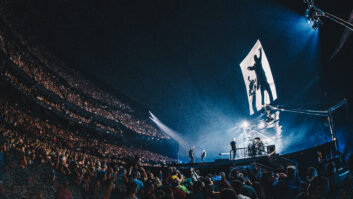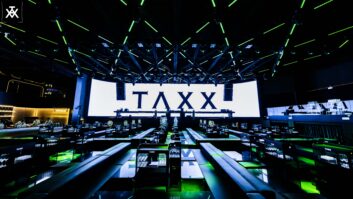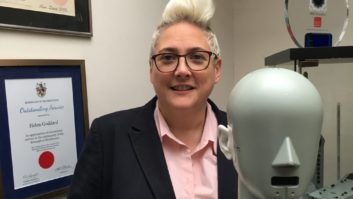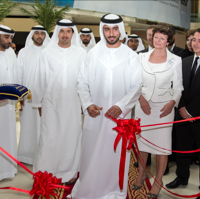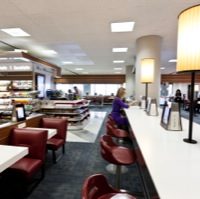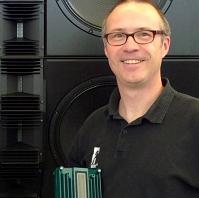For Dubai and a number of other United Arab Emirates states, the past 10 years have witnessed a phenomenal expansion in construction and development. Throughout this productive decade, investment levels have arguably been without precedent in modern times.
Inevitably, many AV manufacturers and installers have taken time to explore the key emerging markets of the Middle East. Not everyone has been successful, but those companies with the patience – and resources – to establish local offices and support teams have generally made impressive progress.
If the recent avalanche of apocalyptic newspaper reports is anything to go by, however, Dubai’s period of great prosperity may be nearing an end. The property boom is over, analysts claim: there are too many palatial villas that can’t be sold; too many apartment complexes with no obvious purchasers.
Predictions regarding the likely drop in Dubai property prices vary considerably, but there is no doubt that there has already been a dramatic slowdown in construction. Right now, many AV manufacturers and integrators are still engaged with multiple projects initiated one or more years ago. The pertinent issue going forward is quite how busy are they are going to be 12 or 18 months from now.
Tougher market conditions in Dubai appear to be a certainty, then, but what of the other Middle Eastern territories that have been on the lips of AV professionals these past few years? While demand in Abu Dhabi, Saudi Arabia, Qatar, Oman and several others has not yet come close to rivalling that in Dubai, there is a general feeling that these markets will continue to develop, albeit possibly at a slower rate than in the recent past.
As this feature should make clear, however, there are still plenty of opportunities in most Middle Eastern markets – Dubai included. There is also no shortage of AV suppliers and installers who are evidently in it for the long haul.
“Six months ago we had the luxury of people knocking on our door and now the situation is reversed, but we’re still getting results – touch wood,” says Koy Neminathan, business development manager for UK-based professional lighting control and dimmer manufacturer Avolites, which has had a presence in the Middle East since the early 1990s. “It might be hard for the next three to six months, but there are still plenty of projects taking place. It’s all about working hard to secure them.”
“While some areas seem to be slowing down, others appear to be in very good shape,” observes Erik Larsen, market manager for Europe at lighting solutions company ETC. “Despite the downturn, we continue to see investment within the Gulf Cooperation Council countries, especially in unique and luxury developments.”
Property pressure
The emergence of vast new property complexes and luxury villas is one of the most obvious signs of Dubai’s development. With these lavish pads proving harder to shift, it is only logical that developers may now focus more firmly on the quality of the end result. In many cases, this could lead to a greater emphasis on residential AV and control technology.
“Developers who can perceive market conditions are becoming more focused on the owner/occupier than the speculator,” reveals David Dobouny, chief executive officer of home automation and guest room management integrator One Media Controls (OMC) Middle East. “They are more likely to want to sell a finished product, and this means looking for points of differentiation – one of which may be home automation.”
Whereas even lighting control was restricted to high-end properties a few years ago, Dobouny reports that there is now greater interest from mid-range developments. In addition, an increasing number of projects are showing interest in more elaborate systems that may incorporate whole-house control.
OMC is a ‘product-neutral’ company, although Dobouny does list some of its most regularly used brands – among them UK-based audio and video multi-room entertainment system manufacturer Opus Technologies. Opus has had a dedicated team in Dubai for the past five years, during which it has provided equipment and expertise for a wide range of installations.
“Some developers are really making an effort to try to differentiate by adding luxuries, and that is good news for a company like ours,” says Simon Hewitt, director of marketing at Opus Technologies.
He adds that the company’s success in the Middle East is partly attributable to having worked the market assiduously over an extended period of time. “You have got to have relationships,” he contends. “A lot of people think they can get away with just one meeting, but that is not the case. It’s about trust and understanding, and working closely on projects is very important.”
Investigating the potential of a region is one thing; founding dedicated offices with their own support teams is quite another. However, many companies have done just that in the past few years, and not even the prospect of more uncertain times is dissuading some companies from establishing new operations.
Just take the example of Dynalite. The Australia-based lighting control and automation group has opened a trio of new technical and sales support offices – located in Amman, Kuwait City and the Dubai Airport Free Zone (DAFZA) – this year.
Asked to explain the intention underlying the new bases, Dynalite regional director Middle East/North Africa, Mutassem Abu Diak, responds: “Dynalite is focused on making its solutions easily accessible to the region, while maintaining the company’s significant involvement in local projects. Our new offices provide a choice of bases from which we can provide frequent and ongoing training and development programmes for clients and channel partners.”
Control and automation system manufacturer Crestron has also recently invested in a new office – situated in Jeddah – to accompany its existing operation in Dubai. “We opened the office on 1 October,” confirms Vincent Philippo, regional director for Crestron Middle East. “Saudi Arabia is a really good market for us. It wants to be one of the top 10 economically strong countries in the world, and I think that it will succeed. Abu Dhabi is also going well.”
Learning curve
In terms of applications, Philippo says that while the residential market has slowed, education is increasingly vibrant. Recent credits include the specification of a Crestron Pro 2-based AV system – supplied by Qatar-based Crestron dealer Techno Q – at the American School of Doha.
Projection solution provider Christie has had an office in the UAE – specifically, within Emirates Group Security HQ in the DAFZA – since 2007, and remains optimistic about growth in both fixed installations and event staging throughout the Middle East. “Although the economic conditions oblige us to be wise and cautious, we’ve seen steady growth in this region in the past few years and we believe the Middle East is one of the most dynamic and creative regions today,” says Simon Smith, Christie’s EMEA sales director.
Progress through adversity?
While no one is claiming that the next 12-18 months will be easy, there is a general belief among those who spoke to IE that rewarding business will continue to be done throughout the harder times.
Dynalite is confident that there will still be “significant activity” in Dubai, with Abu Dhabi another location set to generate opportunities. Green lighting solutions are expected to be particularly in-demand. “With energy efficiency and sustainable design becoming essential to the Middle East building domain, lighting solution providers are being commissioned to provide systems that empower building owners and occupiers to realise effective lighting energy management strategies,” says Abu Diak.
Avolites is intending to widen its appeal in the region when it introduces its first touch-screen console and a new lost-cost dimmer solution later this year. “These products will open up a new market for us, especially in the Middle East,” predicts Neminathan, who adds that the broadcast market remains particularly strong for the company, as illustrated by a raft of installations for Lebanese broadcaster LBC Group.
Meanwhile, show and media control technology developer Medialon continues to attach high expectations to the theme park industry. The company has a string of credits to its name in this area, including the Al Shallal Theme Park in Jeddah. “Even if [the region is] impacted by the crisis, projects are being maintained and the opportunities remain massive in the next three years,” says Benjamin Saint Girons, director of EMEA sales.
“Projects are being put on hold in Dubai,” admits Hans J van den Berg, MD of AV support technology provider Audipack Middle-East, “but in Qatar, Saudi Arabia and Abu Dhabi, everything is continuing. It could all stop in two months’ time, of course, but for now we can’t deliver enough!”
Moving forward, there will continue to be plenty of opportunity for the regional AV industry to fly the flag at key trade events, including PALME Middle East, the 2009 edition of which takes place at the end of this month.
“In these tough times it’s easy for companies to cut marketing budgets, but marketing is half of your sales activity,” argues PALME exhibition director Alexander Heuff. “Companies should be spending more on promotion through trade shows and magazines.”
Moreover, while development may slow considerably during the next few months, the chances are that the region will continue to be the most exciting emerging market for installation technology.
